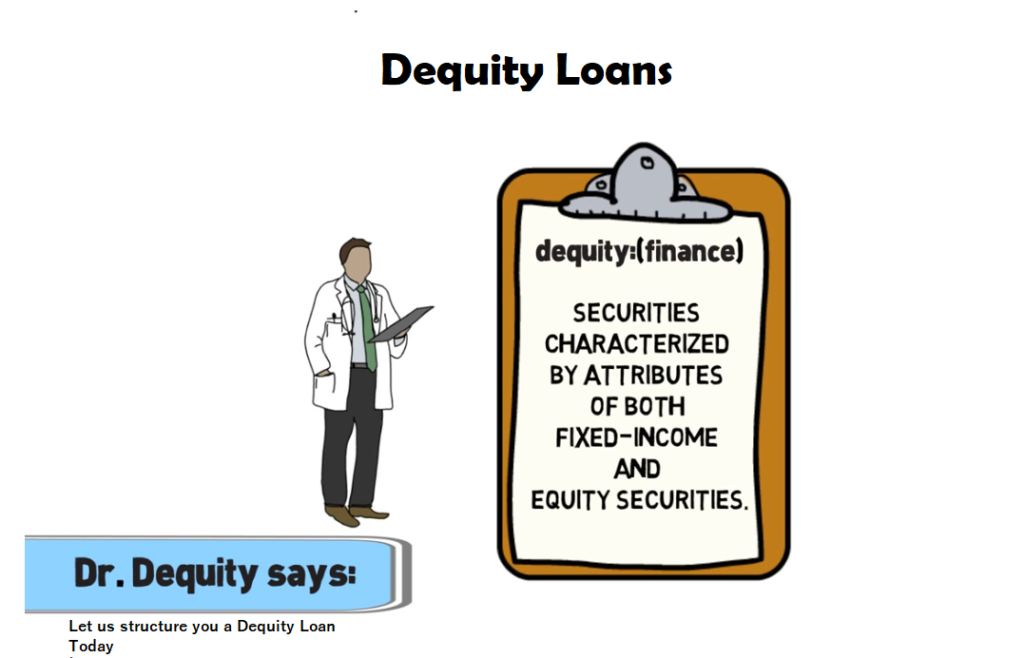CapitalTech’s Dequity Lending program connects borrowers to a global pool of investors, allowing for cross-border financing with ease. As financial markets become more interconnected, The CapitalTech Dequity Lending platform provides the necessary tools for borrowers and investors to navigate international regulations, currency considerations, and global funding sources. Borrowers can tap into capital markets across the world, increasing their chances of securing investment for their projects.

A Dequity loan is a hybrid financial structure that combines elements of both debt and upside participation. It’s often used in real estate or venture financing to provide flexible funding solutions. The term ” CT Dequity” is a blend of “debt” and proforma profit baked into the loan.
Here’s how it generally works:
Debt-like component: The investor or lender provides capital in the form of a loan that has an interest rate and a repayment schedule, similar to traditional debt. The borrower is typically obligated to make regular payments.
Equity-like component: In addition to the fixed interest payments, the lender also receives a share of the “proforma profit” in the project, similar to a preferred equity investor. This gives the lender an additional return on investment for making a higher LTV loan.
Example in Real Estate:
In a real estate deal, a Dequity loan might provide a developer with funds to build a property. The developer would make interest payments like with a standard loan but would share a percentage of the proforma profits with the lender. The lender benefits from both the interest payments and a portion of the proforma profits included in the face amount of the loan.
Dequity structures are appealing for situations where traditional financing may be unavailable or where borrowers want to avoid diluting ownership while giving lenders a baked-in share of the proforma profit.
How CapitalTech Helps borrowers Structure and Market Dequity Loans and the Cost Involved
CapitalTech helps real estate developers structure and market a dequity loan
Below is the process, including the cost component for developing and marketing a Dequity Loan:
- Initial Consultation and Project Assessment
- The real estate developer approaches CapitalTech for financing. After an assessment of the project’s viability, CapitalTech may propose a dequity loan structure.
- Structuring the Dequity Loan
- CapitalTech structures the dequity loan, blending debt (interest payments) and equity (profit-sharing) components.
- Marketing Materials and Offering Documentation
- CapitalTech collaborates with the developer to create compelling marketing materials and offering documents, such as a proforma tern sheet, a landing page, and an investment deck
- Listing on CapitalTech’s Commercial Loan Exchange Platform
- Borrowers can list their dequity loans on the CapitalTech Commercial Loan platform, allowing accredited investors to review and invest in the dequity loan..
- Digital Advertising and Investor Outreach
- CapitalTech launches a digital marketing campaign to promote the dequity loan to accredited investors.
- Investment and Capital Deployment
- Once the loan is purchased, the funds are deployed to the developer for the project. The developer makes periodic payments based on the terms of the dequity loan.
- Ongoing Project Monitoring and Updates
- CapitalTech monitors the project, providing updates to investors through its platform.
- Repayment and Distribution of Returns
- As the project progresses and revenue is generated, the developer repays the loan with interest, and lender receives its distributions. If the project meets or exceeds expectations, investors benefit from profit-sharing.
Summary of Borrower’s cost:
- Platform onboarding and Consultation fee – $500.00.
- Success fee – 1.5% of the loan amount for loan structuring (paid at closing)
- Legal – The legal documents are paid directly to the law firm for preparing the Borrowing Agreement, the Promissory Note and the Mortgage, and any other documents or collateral agreements needed.
- Marketing fee – $2,000 for preparing marketing materials for digital marketing and landing pages.
- Digital marketing fee – Based on the third-party ad spend approved by the Borrower.
This multi-faceted compensation model ensures that CapitalTech is fairly compensated for its advisory, structuring, marketing, and platform services while aligning its incentives with the success of the real estate developer’s project.